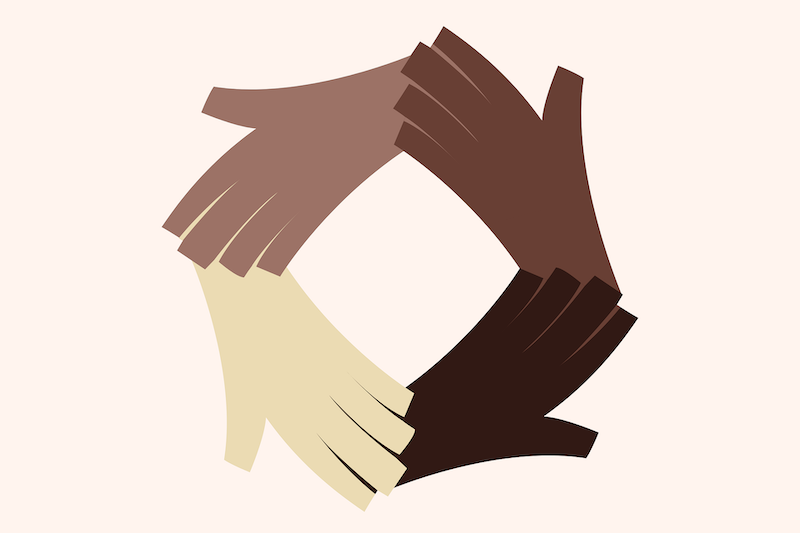Racism and Therapy: Committing to Change in 2021
-
-
Anthea Benjamin
What will the therapy profession do in this new year to ensure it stays awake to the reality of racism? What can individuals do to contribute to collective change? After a year of talking and training around these issues, Arts Psychotherapist, Adolescent Counsellor and Group Analyst Anthea Benjamin reflects on ‘black fatigue’ and Brené Brown’s notion of vulnerability in leadership – and shares some ways in which we can all become engaged with power issues and work towards the decolonisation of therapy.

‘We cannot control what systems or culture we are born into, but we can control how we engage with or attempt to change those systems’ (Staci K Haines in The Politics of Trauma)
‘Our very bodies house the unhealed dissonance and trauma of our ancestors’ (Resmaa Menakem in My Grandmother’s Hands)
As I enter 2021 still feeling the fatigue of the long hard year of 2020, I have been reflecting on lessons learnt and how to stay positive into the New Year. Most of 2020 has been plagued by Covid-19 and the profound impact on us all as a worldwide community. Many have taken the harder, blunt end of this pandemic and Christmas has no doubt left many still grieving these painful and untimely losses. One of those losses, not due to Covid-19 but another virus, a virus of hate called racism, was George Floyd.
Several months on from this murder, we have seen several changes such as an increase in representation across media of people of colour. I have not seen so much diversity representation across genres of programming in my lifetime. Although this is a welcomed change, there is still much more work to be done to address the on-going structural and systemic racism across the world community. This work is hard and long and has left many casualties. This is also the reason why this change must be achieved through a collective movement, rather than a few overburdened individuals.
As a psychotherapist and Group Analyst, I am passionate about decolonising the practice of therapy, which means including intersectional perspectives and social justice frameworks. For me, this means reflecting on my practice and interrogating how I, and institutions I work for, can examine the rigid Eurocentric frameworks we often work within.
This has meant a commitment to continually reviewing my practice again throughout the Covid-19 pandemic. Reading has been a great source of inspiration. Recently I have been reading a book called Black Fatigue: How racism erodes the mind, body, and spirit, by Mary-Frances Winter. She writes about the exhaustion experienced by many people of colour in talking about these issues. Since April 2020, I have been talking, training, and running reflective groups in organisations to support them in reflecting about structural racism and how they are complicit in maintaining this. Change cannot take place with simply good intentions; we need to be consistent and committed to this change. This is life work.
Talking about race is demanding. Asking others to challenge themselves in staying engaged with these conversations is even harder, leading to much challenge and criticism. This is work we can all be doing within our sphere of influence. It is these conversations that build momentum and create a ripple effect.
I have long been a fan of Brené Brown in her writing about vulnerability in leadership. She has written extensively about vulnerability as a strength in its honest transparency and accountability to those we serve. The challenge of leading with vulnerability is in tolerating the level of exposure and working in the here and now. But it is exactly this kind of leadership that is required to do this work. I, alongside, many other colleagues who have been working relentlessly hard, have been left reflecting on the cost of this work. The term ‘black fatigue’ seems fitting and useful in understanding this struggle.
So, what can we all do to work towards change? I have found peer supervision spaces particularly useful – ones in which I have been working with white allies to think in depth about our practice, and we have agreed to call each other out in how we can go unconscious and replicate oppressive practice. These have been challenging spaces but essential in staying in contact with how pervasive unconscious bias is in all of us.
I have also found doing work in both own (black, white, dual heritage and other racial / cultural groupings) racial identity groups and mixed racial group spaces useful in both resourcing myself and continuing the required work in staying engaged with dialogue about power relations.
Mary Frances-Winter uses a term, ‘Living while Black’, which was coined to reflect the myriad of injustices inflicted upon people of colour. Social change can only take place with a critical mass of people coming together to build collective safety throughout society within systems that support this. We are all an important part of this process.